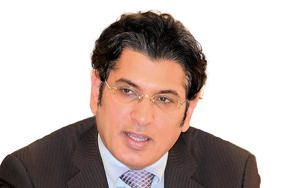Prince Saud Al-Faisal an institution in diplomacy

The prince left for health reasons after serving for almost 40 years as Saudi Arabia’s top diplomat and the most accomplished in the Arab world. Despite his ill health, and in a bid to benefit from his experience and skills, Custodian of the Two Holy Mosques King Salman has appointed him minister of state, a member of the Council of Ministers, the king’s special adviser and envoy, and supervisor of foreign policy.
This reflects the Saudi leadership’s appreciation for hard work, sincerity and dedication that has characterized Prince Saud’s illustrious career over the years.
The comments of diplomats the world over have shown just how much standing Prince Saud has on the international stage. US Secretary of State John Kerry said he had gained invaluable experience from the prince and would continue to seek out his advice on issues.
He won over most of these people with his candid and persuasive style, underpinned by a resolute commitment to a set of values and principles. His tenure has been marked by realism and logic, with an aversion for sentimentality and arbitrary policymaking.
This approach has won him global respect and admiration, and ensured that Saudi Arabia has become the diplomatic powerhouse that it currently is in the region. The prince’s unflinching stand on various issues has always been part of his personality.
UAE Foreign Minister Sheikh Abdullah bin Zayed Al-Nahyan summed it up quite succinctly when he said Prince Saud “is a rare kind of minister” whose personality has shaped Islamic and Arab history. He said a man can only “stand in awe” at these types of personalities, whose words and actions are imbued with such poetry and decisiveness.
Saudi diplomacy has faced several significant challenges over the years including Operation Desert Storm, the Sept. 11 attacks, and the Arab Spring. During these times, Prince Saud’s voice has always been forceful and authoritative on Arab issues in world capitals.
Notwithstanding his failing health in recent years, the prince had adopted a punishing schedule by visiting several nations to articulate Arab positions in a fair and clear manner. It was Prince Saud who convinced the West that the events on June 30, 2013 in Egypt were a people’s revolution calling for change.
Prince Saud has undoubtedly left behind an enormous diplomatic legacy and a generation of Saudi diplomats who have been schooled in his style and approach. Those following him may bring their own personalities to bear on the position, but not the underlying principles of Saudi foreign policy that he has worked so hard to articulate and propagate.
Disclaimer: Views expressed by writers in this section are their own and do not necessarily reflect Arab News' point of view










































